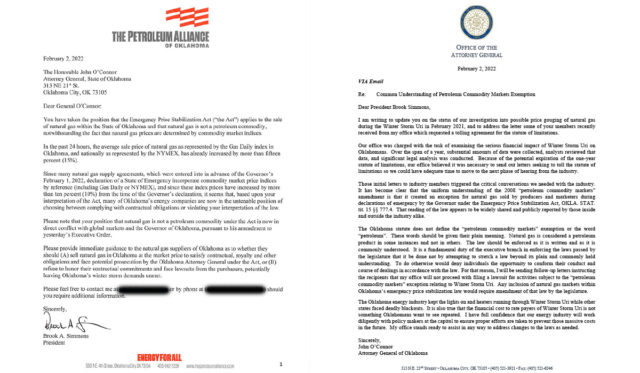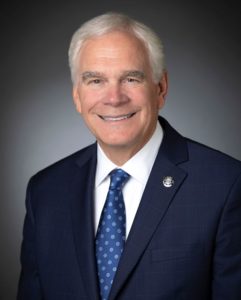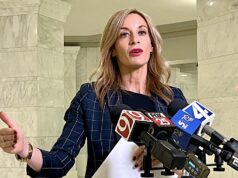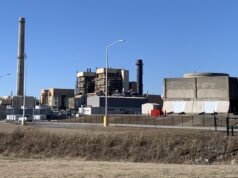

A recent exchange of correspondence with oil and gas industry leaders may have left Oklahoma Attorney General John O’Connor in an awkward place with petroleum companies and the public.
After learning that the “uniform understanding” of Oklahoma’s Emergency Price Stabilization Act considers natural gas to be petroleum — and thus qualifies it for an exemption — O’Connor wrote to an industry leader Wednesday that his office “will not proceed with filing a lawsuit” previously threatened against petroleum companies who sold natural gas during the price-spiking February 2021 winter storm.
O’Connor sent his Wednesday letter in response to the Petroleum Alliance of Oklahoma President Brook Simmons’ own epistle, which noted “the fact that natural gas prices are determined by commodity market indicies” and, thus, are listed atop an exemption in the Emergency Price Stabilization Act.

After considering Simmons’ response, O’Connor walked back a prior letter he had sent to dozens of oil and gas operators, marketers and midstream companies — in Oklahoma and in other states — that had threatened lawsuits unless recipients signed a tolling agreement to continue discussions beyond a looming one-year statute of limitations.
Along with a private attorney contracted through the Texas law firm of Burns Charest, O’Connor wrote in his late-January letters that his office was investigating companies for “charging excessive prices for natural gas during and after Winter Storm Uri.”
“If we do not hear back by Feb. 8, 2022, we will file suit,” O’Connor had written in bold.
Days later, in his follow-up letter to Simmons, O’Connor said he wanted “to update you on the status of our investigation into possible price gouging of natural gas.”
“The Oklahoma statute does not define the ‘petroleum commodity markets’ exemption or the word ‘petroleum.’ These words should be given their plain meaning,” O’Connor wrote Wednesday. “Natural gas is considered a petroleum product in some instances and not in others. The law should be enforced as it is written and as it is commonly understood. It is a fundamental duty of the executive branch in enforcing the laws passed by the Legislature that it be done not by attempting to stretch a law beyond its plain and commonly held understanding. To do otherwise would deny individuals the opportunity to conform their conduct and course of dealings in accordance with the law.”
Cody Bannister, senior vice president of communications for the Petroleum Alliance, told NonDoc that Simmons declined to comment on the exchange with O’Connor, who was appointed attorney general in late July by Gov. Kevin Stitt. (Simmons CC’d Stitt, Secretary of Energy Ken Wagoner and all three corporation commissioners on his letter to O’Connor.)
Madelyn Sheriff, press secretary for O’Connor, provided a statement on the issue.
“The Office of Attorney General has been undertaking an investigation into price gouging since last year,” Sheriff said. “The investigation is still under way. We can’t provide additional details or comments at this time.”
As O’Connor corresponds with industry, Stitt amends executive order
In writing to O’Connor about the attorney general’s letters threatening lawsuit against nearly 100 companies, Petroleum Alliance President Brook Simmons noted the precarious timing of the correspondence as the state braced for another significant winter storm.
“In the past 24 hours, the average sale price of natural gas as represented by the Gas Daily index in Oklahoma, and nationally as represented by the NYMEX, has already increased by more than 15 percent,” Simmons wrote.

He referenced Stitt’s Feb. 1 preemptive declaration of a “state of emergency” and noted that many existing natural gas supply agreements “incorporate commodity market price indicies.”
“Since these index prices have increased by more than 10 percent from the time of the governor’s declaration, it seems that, based upon your interpretation of [the Emergency Price Stabilization Act], many of Oklahoma’s energy companies are now in the untenable position of choosing between complying with contractual obligations or violating your interpretation of the law,” Simmons wrote. “Please note that your position that natural gas is not a petroleum commodity under the act is now in direct conflict with global markets and the governor of Oklahoma, pursuant to his amendment to yesterday’s executive order.”
Signed Feb. 1, Stitt’s original executive order declaring the storm-related state of emergency said the storm “may result in an increased demand for liquified petroleum gas (a/k/a “propane”) and certain other fuels.”
But as O’Connor and Simmons exchanged letters Wednesday, Stitt amended his order to include “wholesale demand for petroleum commodities such as natural gas.”
Simmons concluded his letter to O’Connor by outlining the unpleasant options facing his organization’s members.
“Please provide immediate guidance to the natural gas suppliers of Oklahoma as to whether they should (A) sell natural gas in Oklahoma at the market price to satisfy contractual, royalty and other obligations and face potential prosecution by the Oklahoma Attorney General under the act, or (B) refuse to honor their contractual commitments and face lawsuits from the purchasers, potentially leaving Oklahoma’s winter storm demands unmet.”
In his response to Simmons, O’Connor said his office’s original letters to petroleum companies were intended to “toll the statute of limitations so we could have adequate time to move to the next phase of hearing from the industry.”
“Those initial letters to industry members triggered the critical conversations we needed with the industry,” O’Connor wrote. “It has become clear that the uniform understanding of the 2008 ‘petroleum commodity markets’ amendment is that it created an exception for natural gas sold by producers and marketers during declarations of emergency by the governor under the Emergency Price Stabilization Act. That reading of the law appears to be widely shared and publicly reported by those inside and outside the industry alike.”
He concluded by saying his office wanted to work with the energy industry at the State Capitol on ways to prevent future storm-related price spikes for utility ratepayers.
“The Oklahoma energy industry kept the lights on and heaters running through Winter Storm Uri while other states faced deadly blackouts,” O’Connor said. “It is also true that the financial cost to ratepayers of Winter Storm Uri is not something Oklahomans want to see repeated.”
Indeed, Oklahomans from across the political spectrum have expressed frustration with the pending tariffs proposed for their utility bills as a way to pay off the billions of dollars in debt that electricity and gas utilities incurred from high natural gas prices during the February 2021 storm.




















